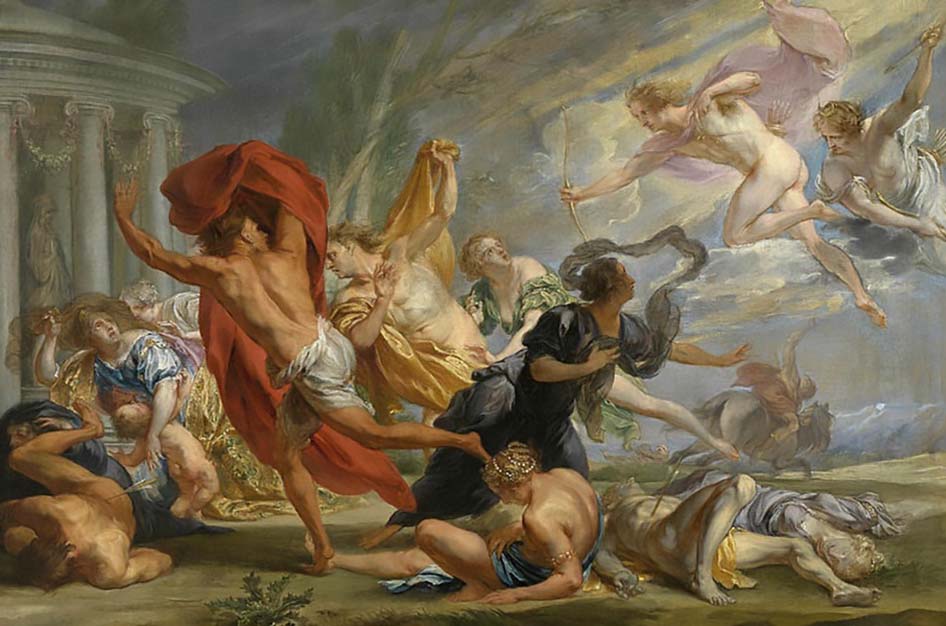Niobe
There are so many tales of the vanity of kings and queens that the half of them cannot be told. There was Cassiopaeia, queen of Ethiopia, who boasted that her beauty outshone the beauty of all the sea-nymphs, so that in anger they sent a horrible sea-serpent to ravage the coast.
The king prayed of an Oracle to know how the monster might be appeased, and learned that he must offer up his own daughter, Andromeda. The maiden was therefore chained to a rock by the sea-side, and left to her fate. But who should come to rescue her but a certain young hero, Perseus, who was hastening homeward after a perilous adventure with the snaky-haired Gorgons.
Filled with pity at the story of Andromeda, he waited for the dragon, met and slew him, and set the maiden free. As for the boastful queen, the gods forgave her, and at her death she was set among the stars. That story ended well.
But there was once a queen of Thebes, Niobe, fortunate above all women, and yet arrogant in the face of the gods. Very beautiful she was, and nobly born, but above all things she boasted of her children, for she had seven sons and seven daughters.
Now there came the day when the people were wont to celebrate the feast of Latona, mother of Apollo and Diana; and Niobe, as she stood looking upon the worshippers on their way to the temple, was filled with overweening pride.
"Why do you worship Latona before me?" she cried out. "What does she possess that I have not in greater abundance? She has but two children, while I have seven sons and as many daughters. Nay, if she robbed me out of envy, I should still be rich. Go back to your houses; you have not eyes to know the rightful goddess."
Such impiety was enough to frighten anyone, and her subjects returned to their daily work, awestruck and silent.
But Apollo and Diana were filled with wrath at this insult to their divine mother. Not only was she a great goddess and a power in the heavens, but during her life on earth she had suffered many hardships for their sake.
The serpent Python had been sent to torment her; and, driven from land to land, under an evil spell, beset with dangers, she had found no resting-place but the island of Delos, held sacred ever after to her and her children. Once she had even been refused water by some churlish peasants, who could not believe in a goddess if she appeared in humble guise and travel-worn. But these men were all changed into frogs.
It needed no word from Latona herself to rouse her children to vengeance. Swift as a thought, the two immortal archers, brother and sister, stood in Thebes, upon the towers of the citadel. Near by, the youth were pursuing their sports, while the feast of Latona went neglected. The sons of Queen Niobe were there, and against them Apollo bent his golden bow.
An arrow crossed the air like a sunbeam, and without a word the eldest prince fell from his horse. One by one his brothers died by the same hand, so swiftly that they knew not what had befallen them, till all the sons of the royal house lay slain. Only the people of Thebes, stricken with terror, bore the news to Queen Niobe, where she sat with her seven daughters. She would not believe in such a sorrow.
"Savage Latona," she cried, lifting her arms against the heavens, "never think that you have conquered. I am still the greater."
At that moment one of her daughters sank beside her. Diana had sped an arrow from her bow that is like the crescent moon. Without a cry, nay, even as they murmured words of comfort, the sisters died, one by one. It was all as swift and soundless as snowfall.
Only the guilty mother was left, transfixed with grief. Tears flowed from her eyes, but she spoke not a word, her heart never softened; and at last she turned to stone, and the tears flowed down her cold face forever.
[1]
The Niobids
The Niobids was the collective name given to the children of King Amphion of Thebes, and his wife Niobe. The Niobids are best remembered from a tale in Greek mythology that see them slaughtered by Apollo and Artemis because of their mother’s hubris.
The setting for the tale of the Niobids is the city of Thebes, where Amphion and Zethus, sons of Zeus, had usurped the rule of Lycus (who himself was a usurper).
Amphion and Zethus would briefly rule together, though, Zethus would commit suicide when his wife killed their son. Amphion found himself a wife of good standing, for he married Niobe, the daughter of King Tantalus.
Niobe would give birth to a number of children by Amphion, although there is little agreement in the ancient sources about the number, with a range between 4 and 20 given. It was generally agreed that there were an equal number of sons and daughters born to Amphion and Niobe.
As there is no agreement on numbers of children, there is no agreement on names, but in the Bibliotheca, 7 sons and 7 daughters are named; the sons being Agenor, Damasichthon, Eupinytus, Ismenus, Phaedimus, Sipylus and Tantalus, whilst the daughters are named as, Astycrateia, Astyoche, Cleodoxa, Ethodaia, Ogygia, Pelopia and Phthia.
No matter how many, nor what their names might have been, the children of Amphion and Niobe were collectively known as the Niobids.
Niobe would begin to think more and more highly of herself, for she held position and had wealth, and now had a multitude of healthy children; and Niobe would begin to wonder why the population of Thebes worshipped gods and goddesses rather than herself.
Niobe would then proclaim herself superior to the gods, and in particular, superior to Leto, for whilst Leto, the goddess of motherhood, had but two children, Apollo and Artemis, Niobe had many.
Such hubris is unlikely to go unnoticed by the gods and goddesses, and Apollo and Artemis took it upon themselves to avenge their insulted mother.
Thus, the son and daughter of Leto came to Thebes, and taking up their bow and arrows shot down the Niobids, with Apollo killing the sons of Amphion, and Artemis, the daughters.
Amphion would fall upon his own sword when he saw his children dead, whilst Niobe, overcome by grief could do nothing but weep.
For several days the bodies of the Niobids lay unburied, for whilst the massacre of the Niobids had been taking place, Zeus had turned the Thebans to stone, but eventually, the gods themselves decided to bury the Niobids.
The death of the Amphion and the Niobids meant that this short-lived dynasty came to an end, and Laius, the rightful ruler of Thebes, became king.
Now, it was generally considered that no one survived amongst the Niobids, but occasionally it was suggested that one, or two, of the children of Amphion and Niobe did survive.
Most commonly it was suggested that a daughter, Meliboea, survived the attack having prayed to the goddess Leto. Having witnessed the death of her siblings, her skin turned pale, and Meliboea was thereafter known as Chloris.
Chloris would become Queen of Pylos, having married Neleus, and would become mother to many, including Nestor. Those that think no-one survived the massacre of the Niobids, though, tell of this Chloris being the daughter of a different Amphion.
Similarly, a few sources tell of one of the male Niobids, Amyclas, surviving the killing of his siblings, by also pleading with Leto. Amyclas was said to have left Thebes when Laius became king, and travelling to Laconia, established the city of Amyclae, although this founding was more commonly said to have been done by Amyclas, son of Lacedaemon.

Sources
Ovid, Metamorphoses VI.145–310.
Pseudo-Apollodorus, Bibliotheca III.5.6.
Pliny the Elder (1938). Natural History. 2. Translated by H. Rackham. p. 337.
Iliad 24.603–610.
Iliad xxiv.602ff
Pausanias. Description of Greece 2.21.9
[1] "Tales Beyond Belief"
"Greek Legends and Myths"













